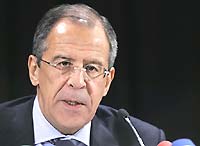Lavrov warns NATO against compromising Russia's security
Foreign Minister Sergey Lavrov on Tuesday warned NATO against steps that would compromise Russian security, pointing to persistent disagreements on arms control.

Speaking at the opening of a session of the Russia-NATO Council, Lavrov said Russia and the alliance face "difficult work" on issues including missile defense, Kosovo and the Conventional Forces in Europe treaty.
"These issues touch on key aspects of European and international security, and aspects of strategic stability," he said. "Of course, it's necessary to approach them in a way that reflects care for each other's stability and security _ not taking any steps aimed at improving someone's security at the expense of the security of others."
Russia has been wrangling with the West over the a Soviet-era treaty governing the deployment of conventional forces and over U.S. plans to deploy missile defense facilities in Poland and the Czech Republic - former Soviet satellites that are now in NATO.
NATO Secretary-General Jaap de Hoop Scheffer said the meeting of ambassadors to NATO would allow Moscow and the alliance to seek ways to "build on the successes" and tackle issues on which they disagree.
"As Cold War adversaries, the task of building a genuine Russia-NATO partnership has never been an easy one," Scheffer said. However, he said that in the past decade Russia and NATO and made good progress in building "a durable, mutually beneficial relationship."
He cited cooperation on anti-terrorism efforts, including patrols in the Mediterranean Sea, improved interoperability of forces and joint efforts to confront drug trafficking from Afghanistan.
Scheffer said the Russian parliament's ratification last month of a treaty with NATO governing the status of forces sent to other countries would support cooperation in stabilizing Afghanistan.
Scheffer, who arrived Monday, was to meet later Tuesday with President Vladimir Putin.
His visit precedes Putin's trip to the United States for a meeting with President George W. Bush that appears likely to focus on missile defense.
Moscow says it does not believe Washington's assurances that the planned facilities in Poland and the Czech Republic are meant to counter a potential threat from Iran, suggesting that they are aimed at weakening Russia's arsenal. Scheffer repeated the U.S. contention Monday, saying the plan represented no danger to Russia.
Russia is also deeply at odds with the West over the status of Kosovo. The U.S. and EU nations favor a U.N. plan that would give the breakaway Serbian province supervised independence, which says it will opposes any agreement that does not satisfy traditional ally Serbia.
Relations have also been strained by a dispute over the Conventional Forces in Europe Treaty, signed in 1990 and amended in 1999 to reflect changes after the 1991 breakup of the Soviet Union.
Russia has ratified the amended version, but the United States and other NATO members have refused to do so until Moscow withdraws troops from the ex-Soviet republics of Moldova and Georgia - an issue Moscow says is unrelated. Russia has warned it could pull out of the treaty, and a special meeting Russia called this month failed to end the dispute.
Subscribe to Pravda.Ru Telegram channel, Facebook, RSS!





